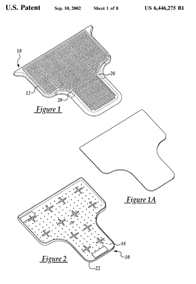
Wright sued Renaldo and her firm for legal malpractice involving the prosecution of his patent directed to an absorbent mat. Renaldo allegedly erred in (1) failing to remove the name of an originally listed co-inventor; (2) “improperly drafted documents submitted to the patent office, and (3) failed to recognize and take steps to correct the patent because it did not adequately protect Wright’s invention.”
Without reaching the merits of the malpractice claim, the court agreed that the claim was barred by a Michigan two-year statute of limitations. Under Michigan law, a plaintiff “must file a legal-malpractice action within two years of the attorney’s last day of service to the plaintiff or within six months of when the plaintiff discovered or should have discovered the claim, whichever is later.” Here, there was evidence that Wright had been planning a malpractice claim for over two years after White revoked her power of attorney and hired different counsel.
A dissenting judge argued that the two-year time line had not expired because Renaldo had not learned of the revocation of the power of attorney until much later.
Although the patent attorney won this case, it should serve as a reminder to counsel to promptly memorialize a disengagement.
The nugget to grab from this case is to remember that the date of revocation of POA before the USPTO is independent from a general revocation of POA as applied to state malpractice claims. That is, the SOL for malpractice begins tolling upon revocation, opposed to a later date for approval by the Commissioner.
“Can anyone post a link to this case or to further details on this case please? Thanks.”
Majority opinion: link to coa.courts.mi.gov
Dissent: link to coa.courts.mi.gov
Prof. Crouch’s advice about memorializing disengagement from representation is certainly correct, but unfortunately is unrelated to the particular facts of this case, where it appears that the client did not want the “different counsel” to submit to the PTO the client’s revocation of the prior power to Renaldo and her firm. One apparent purpose for delaying submission of the revocation was to prevent the statute of limitations from running on the purported malpractice claim.
It is difficult to see where an attorney could memorialize a disengagement from representation when the attorney has no reason to know that representation has in fact been terminated by the client.
The opinion and dissent differ on when representation indeed did end, since Renaldo and her firm had no actual knowledge of it. IMHO the majority reached the right decision, but on the equitable consideration of the client’s intent to conceal the substitution of counsel.
I would note that it appears that the different counsel submitted the revocation with his first communication to the PTO despite the client’s desires. IMHO such submission was ethically required and I applaud different counsel for doing so. (Disclaimer: While I have never practiced with Arnie I have known him for more than 25 years.)
Can anyone post a link to this case or to further details on this case please? Thanks.
No — might is wright
For sure, Renaldo should be Rinaldo.
I’m guessing it’s a typo.
Has anyone heard of the fact that a patent counsel had been sued for malpractice and lost the case? Don’t forget the fact and a classic saying that Law protects only those who know the law, but the fools.
Roger, it sounds like White, the plaintiff who was dissatisfied with her patent counsel, filed a new POA revoking the POA she had given to Renaldo. But there was evidence that already at that time, White was planning to sue Renaldo for malpractice. Ergo, the two years started running at the time White revoked Renaldo’s POA (if not earlier). White then waited more than two years before filing suit against Renaldo, hence the claim was barred.
At least that’s how I understand the facts from the post.
“Here, there was evidence that Wright had been planning a malpractice claim for over two years after White revoked her power of attorney and hired different counsel.”
I’m confused by this sentence. Who is White? How can someone revoke a Pwr of Atty and hire different counsel and not know they did so?
Comments are closed.